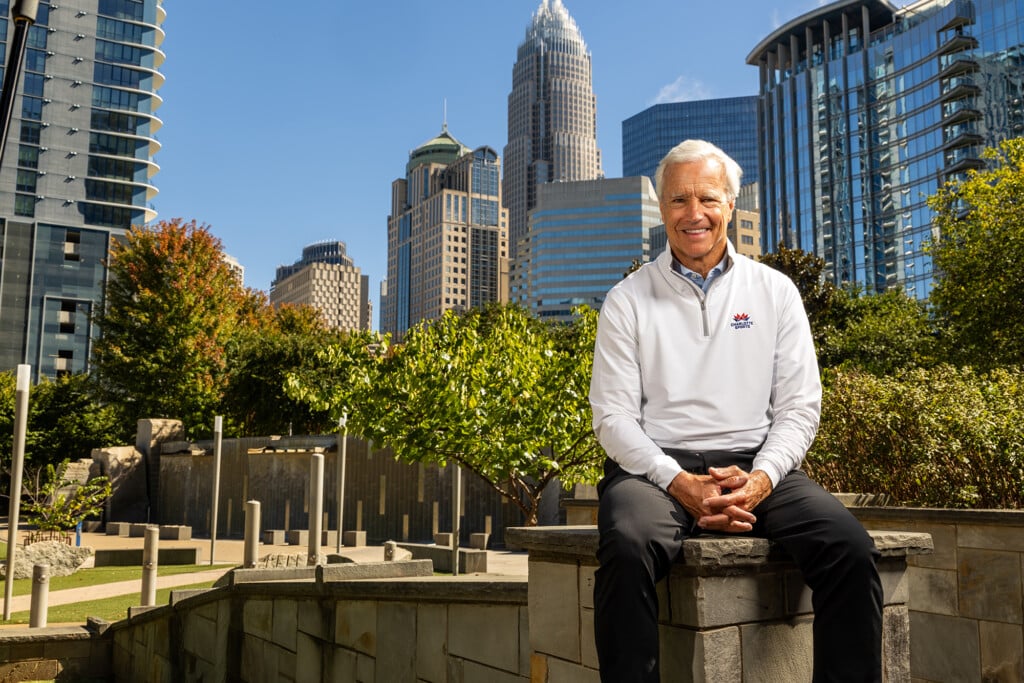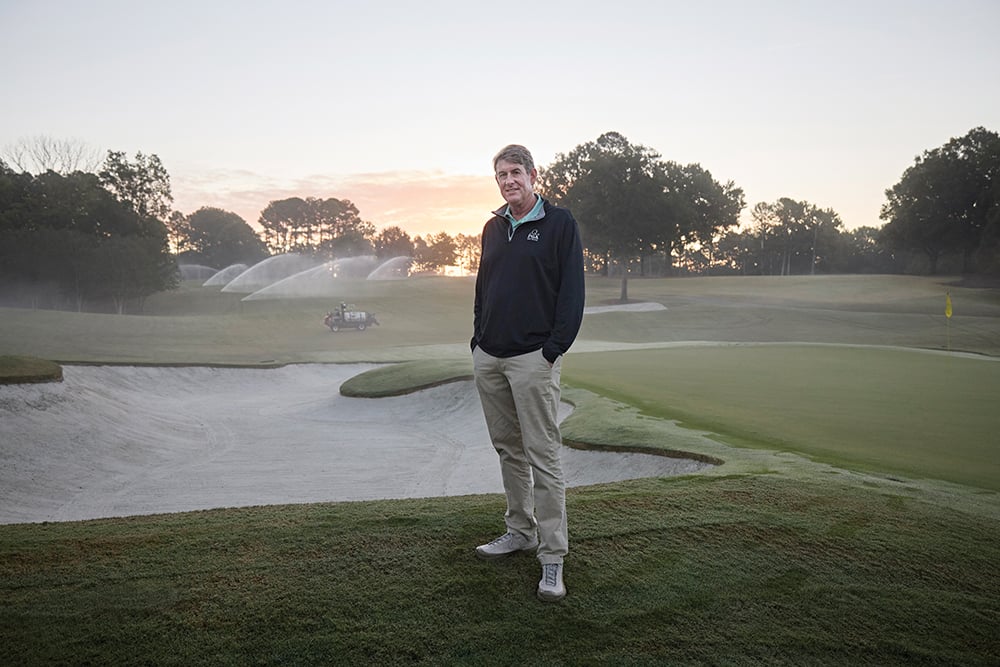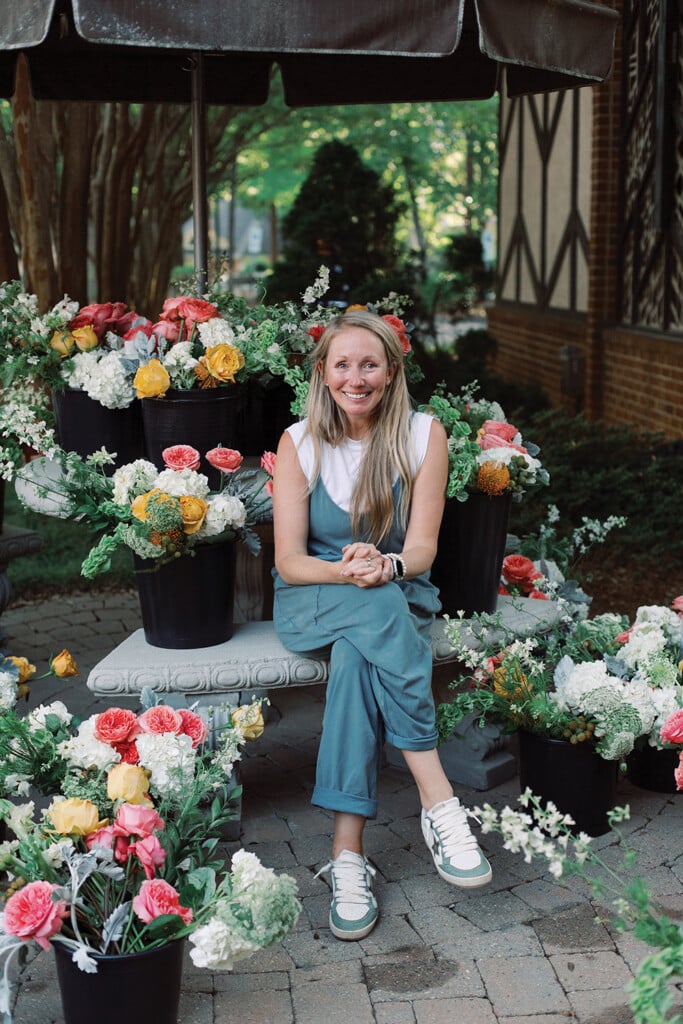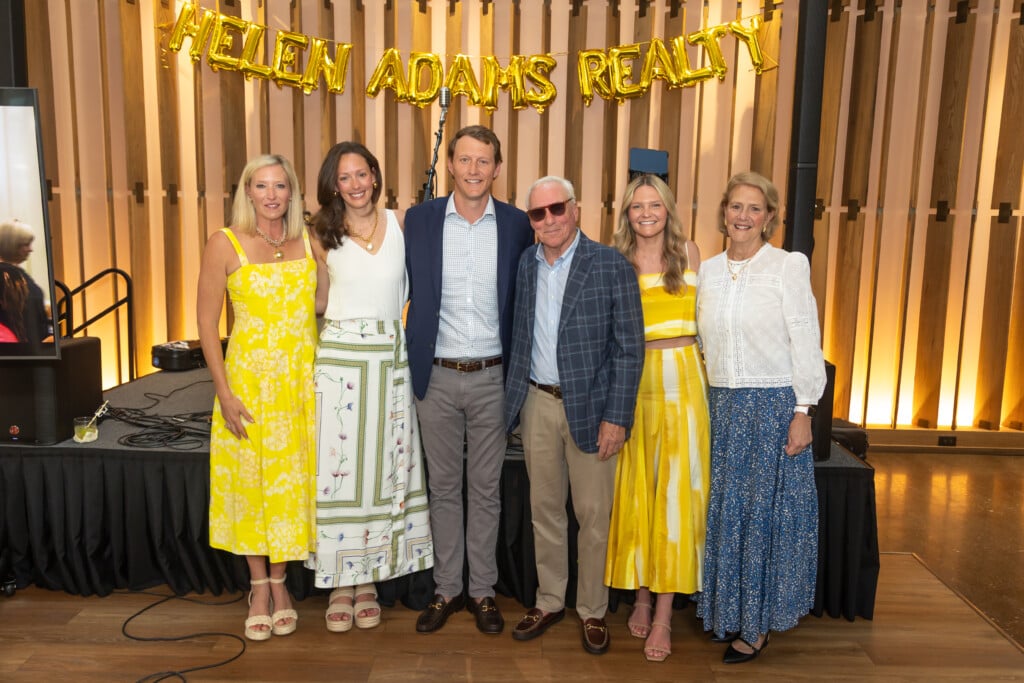2024 Charlotteans of the Year: Danny Morrison
In five years, the former Panthers president has boosted the city’s stature in college sports

Danny Morrison, an old basketball coach, takes my pen and starts to diagram something on his legal pad, as if he’s drawing up a play during a timeout. On the surface, he’s talking about his commissionership of the Southern Conference in the early 2000s, how difficult it was to guide a group of 12 competing institutions, what he refers to as “a microcosm of higher ed in America”—small and private, large and public, military—into cooperation. But he’s really illustrating something deeper.
Morrison draws x- and y-axes in the shape of a cross. He labels the top “competition,” the bottom “cooperation,” the left “community,” and the right “efficiency.” “So, this is tension, right, between those two? Competition and cooperation,” he says as he moves the pen back and forth between them. “There’s tension between being efficient and building community, right?” Then he circles the word he’s written in all caps in the center of the four: TRUST. “And it’s all held together by trust. If the trust unravels, then your whole conference unravels. That’s what happened to the Pac-12.”
The diagram applies to sports conferences and organizations like the one he’s led as executive director since 2019: the Charlotte Sports Foundation, a nonprofit that organizes large-scale events like the Duke’s Mayo Classic, Duke’s Mayo Bowl, and ACC Championship Game, and which is increasingly branching into sports other than football. But it can apply to any effort that involves people and goals—and since he took charge of the CSF, Morrison has harnessed his team of eight full-time staffers to boost Charlotte’s profile in an area the city had never explored much: college sports.
Charlotte has made plenty of noise in professional sports since the late 1980s. But, despite its position in a pair of states packed with prominent college football and basketball programs—North Carolina and Duke, N.C. State and Wake Forest, Clemson and South Carolina—the city had never really capitalized on its centrality. By 2019, uptown had developed enough hotels, bars, restaurants, and other entertainment options to fulfill another vision in someone’s notebook: Bank of America Stadium and the Spectrum Center as hubs for neutral-site football games and basketball tournaments, the kinds of events that draw thousands of out-of-towners and make hoteliers and restaurant owners happy.
The city already had a postseason bowl game at the stadium. Under Morrison’s leadership, the CSF organized an annual early-season game, the Duke’s Mayo Classic. In just its second year, 2021, the Classic hosted Georgia and Clemson, by far the weekend’s biggest game, and set a single-day record for hotel demand in Mecklenburg County. In 2022, the CSF joined forces with Michael Jordan’s Jordan Brand to create a December basketball tournament, Jumpman Invitational, that draws ranked teams and huge crowds to the arena.
Last season, the CSF launched a women’s college basketball tournament, the Ally Tipoff, which included the Iowa Hawkeyes and their star, Caitlin Clark. This month, the organization will host its first tennis event, the Charlotte Invitational, with stars Carlos Alcaraz, Madison Keys, Sloane Stephens, and Frances Tiafoe. The CSF, which hosts most of its events in the fall, continues to explore the possibility of events in other seasons.
It’s been a remarkable run, especially considering the first Duke’s Mayo Classic was canceled because of COVID. To Morrison, it’s simply a matter of recognizing what Charlotte has developed over the past couple of decades—a tourism infrastructure that can support those kinds of events—and leveraging corporate sponsors and a talented team to realize them.
“I guess as I’ve gotten older, things have gotten simpler,” says Morrison, 71. “It’s really not that complicated: Hire really good people who are highly motivated, who work hard, who get along with people and are smart enough to connect the dots. … If you do that, and people work together, and you work collaboratively, you’re going to have a good outcome. We have a tendency to overcomplicate things. We have a tendency to over-engineer things.”
He’s had enough varied experience to draw out the big lessons. Born in Winston-Salem and raised in Burlington, Morrison thought he’d spend his career as a high school basketball coach and geometry teacher. But after coaching and administrative positions at Elon and Wofford, he took the SoCon job in 2001, then became athletic director at TCU, in Fort Worth, Texas. The Carolina Panthers hired him as team president in 2009, and he stayed in that position for eight years until he resigned to pursue “other endeavors, particularly on the college level,” and joined the CSF board. He’s been at least a part-time Charlotte resident since the Panthers hired him—although his main home with his wife, Peggy, is in Sullivan’s Island, South Carolina, near Charleston.
“I’ll say what I loved about both Fort Worth and Charlotte. I would put the two together,” he says. “In both cases, you’ve got a major metropolitan area with, basically, everything to do. But you still have the warmth and friendliness of a community.”
He’s spoken earlier about how placing Charlotte on a national stage for college sports carries some financial and reputational risk. What if the crowds don’t show up, or the weather’s terrible, and your big event turns out to be a dud? So far, it hasn’t happened, but it’s always possible. You show up anyway, Morrison says: “We’d like to never have a negative, but, you know, you can’t play scared.”





